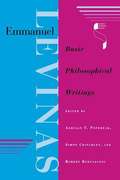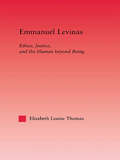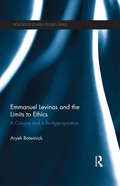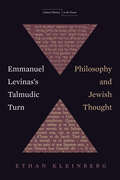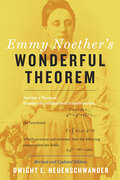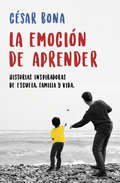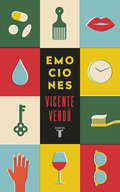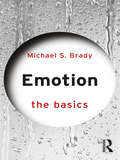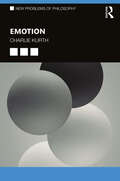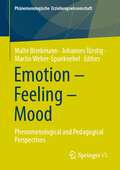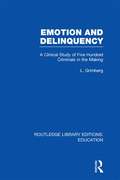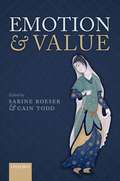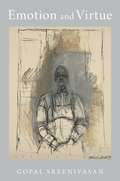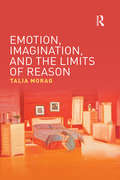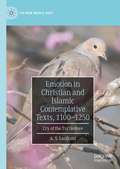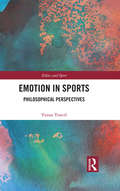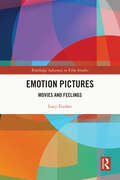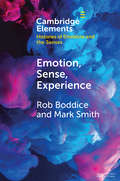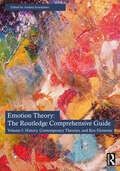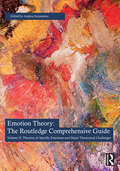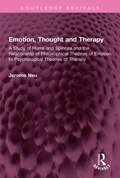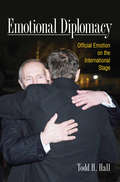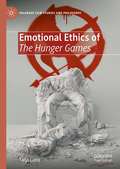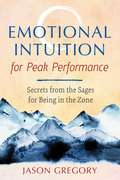- Table View
- List View
Emmanuel Levinas: Basic Philosophical Writings
by Adriaan T. Peperzak Simon Critchley Robert BernasconiEmmanuel Levinas (1906-1996) has exerted a profound influence on 20th-century continental philosophy. This anthology, including Levinas's key philosophical texts over a period of more than forty years, provides an ideal introduction to his thought and offers insights into his most innovative ideas. Five of the ten essays presented here appear in English for the first time. An introduction by Adriaan Peperzak outlines Levinas's philosophical development and the basic themes of his writings. Each essay is accompanied by a brief introduction and notes. This collection is an ideal text for students of philosophy concerned with understanding and assessing the work of this major philosopher.
Emmanuel Levinas: Ethics, Justice, and the Human Beyond Being
by Lis ThomasThis book explores Levinas's rethinking of the meaning of ethics, justice and the human from a position that affirms but goes beyond the anti-humanist philosophy of the twentieth century
Emmanuel Levinas and the Limits to Ethics: A Critique and a Re-Appropriation (Routledge Jewish Studies Series)
by Aryeh BotwinickEmanuel Levinas and the Limits to Ethics highlights how radically different Jewish ethics is from Christian ethics, and the profound affinities that subsist between Jewish ethics and philosophical and political liberalism. The philosophy of Emmanuel Levinas has captured the imagination of a global constituency who take his absolutizing of ethical demands and his assigning primacy to ethics over all other branches of inquiry in his mapping of Western philosophy to be indicative of a major re-ordering of both personal and cultural identity. It is this re-ordering, they believe, that would restore greater wholeness and value to human life. In this book, Aryeh Botwinick takes issue with both the theoretical analysis that Levinas engages in, and the practical ethical import that he draws from it. Arguing that what Levinas has to say about both skepticism and negative theology can be used to re-route his argument away from the avowed aims of his thought, this book will be of great interest to students and scholars of Jewish Studies, Ethics and Philosophy.
Emmanuel Levinas and the Politics of Non-Violence
by Victoria Tahmasebi-BirganiFrench philosopher and Talmudic commentator Emmanuel Levinas (1906-1995) has received considerable attention for his influence on philosophical and religious thought. In this book, Victoria Tahmasebi-Birgani provides the first examination of the applicability of Emmanuel Levinas' work to social and political movements. Investigating his ethics of responsibility and his critique of the Western liberal imagination, Tahmasebi-Birgani advances the moral, political, and philosophical debates on the radical implications of Levinas' work.Emmanuel Levinas and the Politics of Non-Violence is the first book to closely consider the affinity between Levinas' ethical vision and Mohandas Gandhi's radical yet non-violent political struggle. Situating Levinas' insights within a transnational, transcontinental, and global framework, Tahmasebi-Birgani highlights Levinas' continued relevance in an age in which violence is so often resorted to in the name of "justice" and "freedom."
Emmanuel Levinas's Talmudic Turn: Philosophy and Jewish Thought (Cultural Memory in the Present)
by Ethan KleinbergIn this rich intellectual history of the French-Jewish philosopher Emmanuel Levinas's Talmudic lectures in Paris, Ethan Kleinberg addresses Levinas's Jewish life and its relation to his philosophical writings while making an argument for the role and importance of Levinas's Talmudic lessons. Pairing each chapter with a related Talmudic lecture, Kleinberg uses the distinction Levinas presents between "God on Our Side" and "God on God's Side" to provide two discrete and at times conflicting approaches to Levinas's Talmudic readings. One is historically situated and argued from "our side" while the other uses Levinas's Talmudic readings themselves to approach the issues as timeless and derived from "God on God's own side." Bringing the two approaches together, Kleinberg asks whether the ethical message and moral urgency of Levinas's Talmudic lectures can be extended beyond the texts and beliefs of a chosen people, religion, or even the seemingly primary unit of the self. Touching on Western philosophy, French Enlightenment universalism, and the Lithuanian Talmudic tradition, Kleinberg provides readers with a boundary-pushing investigation into the origins, influences, and causes of Levinas's turn to and use of Talmud.
Emmy Noether's Wonderful Theorem
by Dwight E. NeuenschwanderOne of the most important—and beautiful—mathematical solutions ever devised, Noether’s theorem touches on every aspect of physics."In the judgment of the most competent living mathematicians, Fräulein Noether was the most significant creative mathematical genius thus far produced since the higher education of women began."—Albert EinsteinThe year was 1915, and the young mathematician Emmy Noether had just settled into Göttingen University when Albert Einstein visited to lecture on his nearly finished general theory of relativity. Two leading mathematicians of the day, David Hilbert and Felix Klein, dug into the new theory with gusto, but had difficulty reconciling it with what was known about the conservation of energy. Knowing of her expertise in invariance theory, they requested Noether’s help. To solve the problem, she developed a novel theorem, applicable across all of physics, which relates conservation laws to continuous symmetries—one of the most important pieces of mathematical reasoning ever developed.Noether’s "first" and "second" theorem was published in 1918. The first theorem relates symmetries under global spacetime transformations to the conservation of energy and momentum, and symmetry under global gauge transformations to charge conservation. In continuum mechanics and field theories, these conservation laws are expressed as equations of continuity. The second theorem, an extension of the first, allows transformations with local gauge invariance, and the equations of continuity acquire the covariant derivative characteristic of coupled matter-field systems. General relativity, it turns out, exhibits local gauge invariance. Noether’s theorem also laid the foundation for later generations to apply local gauge invariance to theories of elementary particle interactions. In Dwight E. Neuenschwander’s new edition of Emmy Noether’s Wonderful Theorem, readers will encounter an updated explanation of Noether’s "first" theorem. The discussion of local gauge invariance has been expanded into a detailed presentation of the motivation, proof, and applications of the "second" theorem, including Noether’s resolution of concerns about general relativity. Other refinements in the new edition include an enlarged biography of Emmy Noether’s life and work, parallels drawn between the present approach and Noether’s original 1918 paper, and a summary of the logic behind Noether’s theorem.
La emoción de aprender: Historias inspiradoras de escuela, familia y vida
by César Bona«Un viaje hacia la diversidad, una reflexión sobre el éxito, el fracaso y las expectativas que condicionan a niños, niñas y adolescentes y sobre cómo podemos darles la posibilidad de construir su propio futuro.» ¿Qué es el éxito para ti? ¿Y el fracaso? Y si piensas en niños y niñas, ¿qué responderías? Cuando miras a los que te rodean, ¿consideras que estás libre de prejuicios? ¿Hay ciertas creencias que distorsionan tu manera de ver la vida? Como docentes, muchas cosas no nos las enseñaron en la universidad; como padres, vamos aprendiendo a base de ensayo y error. La empatía es un juego que hay que practicar a diario, y eso no implica alejarse de lo que eres sino acercarse a lo que la otra persona es y siente. En el mundo hay casi 8.000 millones de personas, cada una diferente al resto. Las diferencias son un valor y no un inconveniente. Cuando entendamos eso, comenzaremos a ver la vida de otra manera, con la riqueza que proporciona la diversidad. En este libro hallarás historias inspiradoras que invitan a la reflexión sobre todas esas preguntas y sobre el modo en que miramos a los que nos rodean. «No es lo que miras, es lo que ves», decía Thoreau. Y cada palabra, cada gesto, cuenta. La crítica ha dicho...«César está abriendo nuevos horizontes para los niños. Está creando líderes del futuro, animándolos a tomar las riendas para emprender acciones y cambiar actitudes y prácticas en sus sociedades.»Jane Goodall «Mi primer hallazgo de 2015 ha sido conocer la existencia del profesor César Bona. Es un placer comprobar que, de vez en cuando, aparece un personaje humilde capaz de despertar admiración unánime [...]. Enseña a sus alumnos a disfrutar de la naturaleza y de los animales, ya hacer películas, y a jugar, y a imaginar y a pensar en los demás. También les enseña inglés,historia y matemáticas, pero dice que lo más importanteparaél es que sean buenas personas.»Nativel Preciado, Tiempo.
Emociones
by Vicente VerdúUn libro que vibra con toda la sensibilidad, la ironía y la inteligencia que caracterizaban a Vicente Verdú. En este brillante ejercicio literario y filosófico, Vicente Verdú se dedicó a contemplar con detenimiento los espacios, objetos y pequeños instantes que forman parte de nuestra vida cotidiana: las sábanas, el sexo, el momento de despertar, la atracción del parecido, los lunes, la memoria, la mentira... Aparentemente intrascendentes, se vuelven evocadores y emocionantes, y revelan la personalidad del artista y su lúcida e irónica mirada sobre el mundo. Emociones es un libro que nos hace sentir como en casa. La crítica ha dicho:«Verdú era un renacentista moderno que desde el Mediterráneo se trajo a la meseta un modo insólito de interpretar la realidad. Siempre dio muestras radicales de su compromiso con la modernidad, en los cuadros y en los artículos o en los libros.»Juan Cruz, El País
Emotion: The Basics (The Basics)
by Michael BradyWhile human beings might be rational animals, they are emotional animals as well. Emotions play a central role in all areas of our lives and if we are to have a proper understanding of human life and activity, we ought to have a good grasp of the emotions. Michael S. Brady structures Emotion: The Basics around two basic, yet fundamental, questions: What are emotions? And what do emotions do? In answering these questions Brady provides insight into a core component of all our lives, covering: the nature of emotion; emotion, knowledge, and understanding; emotion and action; emotions and social groups; emotion, morality, and art. In this concise and insightful introduction, Brady explains why we are often better off as a result of emotion rather than reason being in the driving seat, as our lives, both individual and social, would be significantly impoverished without the emotions. With a glossary of key terms and suggestions for further reading, Emotion: The Basics is an ideal starting point for anyone seeking a full introduction to the philosophical study of emotion.
Emotion (New Problems of Philosophy)
by Charlie KurthEmotions have long been of interest to philosophers and have deep historical roots going back to the Ancients. They have also become one of the most exciting areas of current research in philosophy, the cognitive sciences, and beyond. In this book, Charlie Kurth explains the philosophy of the emotions, structuring the book around seven fundamental questions: What are emotions? Are emotions natural kinds? Do animals have emotions? Are emotions epistemically valuable? Are emotions the foundation for value and morality? Are emotions the basis for responsibility? Do emotions make us better people? In the course of exploring these questions, he also discusses cutting-edge empirical research on emotion, feminist approaches to emotions and their value, and methodological questions on how to theorize about the emotions. The book also contains in-depth discussions of specific emotions like compassion, disgust, anxiety, and curiosity. It also highlights emerging trends in emotion research. Including suggestions for further reading and a glossary of key terms, Emotion is ideal for those studying and researching the philosophy of emotion as well as ethics, epistemology, and the philosophies of mind and psychology.
Emotion – Feeling – Mood: Phenomenological and Pedagogical Perspectives (Phänomenologische Erziehungswissenschaft #12)
by Malte Brinkmann Johannes Türstig Martin Weber-SpanknebelThis volume provides systematic, interdisciplinary, and intercultural impulses for a phenomenological pedagogy of emotions, feelings, and moods without subordinating them to the logocentric dualism of emotion and rationality. Starting from foundational and cultural perspectives on pedagogical relations of education, learning, and Bildung, specific emotions in individual studies, as well as different approaches of important representatives of phenomenological research on emotions are presented. The contributions include pedagogical, philosophical, and empirical approaches to feelings, emotions, and moods, highlighting their fundamental importance and productivity for learning, Bildung, and education in different pedagogical institutions and fields.
Emotion and Delinquency: A Clinical Study of Five Hundred Criminals in the Making (Routledge Library Editions: Education)
by L GrimbergInevitably a product of the time in which it was published this book discusses important questions of neuro-psychology as well as setting out the early ‘nature versus nurture’ debate. The author also argues for changes in the care and education of those with learning difficulties to enable them to lead fulfilling lives, rather than being incarcerated in institutions (as was routinely the case in 1928).
Emotion and Value
by Sabine Roeser Cain ToddThis volume brings together new work by leading philosophers on the topics of emotion and value, and explores issues at their intersection.
Emotion and Virtue
by Gopal SreenivasanA novel approach to the crucial role emotion plays in virtuous actionWhat must a person be like to possess a virtue in full measure? What sort of psychological constitution does one need to be an exemplar of compassion, say, or of courage? Focusing on these two examples, Emotion and Virtue ingeniously argues that certain emotion traits play an indispensable role in virtue. With exemplars of compassion, for instance, this role is played by a modified sympathy trait, which is central to enabling these exemplars to be reliably correct judges of the compassionate thing to do in various practical situations. Indeed, according to Gopal Sreenivasan, the virtue of compassion is, in a sense, a modified sympathy trait, just as courage is a modified fear trait.While he upholds the traditional definition of virtue as a species of character trait, Sreenivasan discards other traditional precepts. For example, he rejects the unity of the virtues and raises new questions about when virtue should be taught. Unlike orthodox virtue ethics, moreover, his account does not aspire to rival consequentialism and deontology. Instead Sreenivasan repudiates the ambitions of virtue imperialism.Emotion and Virtue makes significant contributions to moral psychology and the theory of virtue alike.
Emotion, Imagination, and the Limits of Reason
by Talia MoragThe emotions pose many philosophical questions. We don't choose them; they come over us spontaneously. Sometimes emotions seem to get it wrong: we experience wrongdoing but do not feel anger, feel fear but recognise there is no danger. Yet often we expect emotions to be reasonable, intelligible and appropriate responses to certain situations. How do we explain these apparent contradictions? Emotion, Imagination, and the Limits of Reason presents a bold new picture of the emotions that challenges prevailing philosophical orthodoxy. Talia Morag argues that too much emphasis has been placed on the "reasonableness" of emotions and far too little on two neglected areas: the imagination and the unconscious. She uses these to propose a new philosophical and psychoanalytic conception of the emotions that challenges the perceived rationality of emotions; views the emotions as fundamental to determining one's self-image; and bases therapy on the ability to "listen" to one’s emotional episode as it occurs. Emotion, Imagination, and the Limits of Reason is one of the first books to connect philosophical research on the emotions to psychoanalysis. It will be essential reading for those studying ethics, the emotions, moral psychology and philosophy of psychology as well as those interested in psychoanalysis.
Emotion in Christian and Islamic Contemplative Texts, 1100–1250: Cry of the Turtledove (The New Middle Ages)
by A. S. LazikaniThis book offers a comparative study of emotion in Arabic Islamic and English Christian contemplative texts, c. 1110-1250, contributing to the emerging interest in ‘globalization’ in medieval studies. A.S.Lazikani argues for the necessity of placing medieval English devotional texts in a more global context and seeks to modify influential narratives on the ‘history of emotions’ to enable this more wide-ranging critical outlook. Across eight chapters, the book examines the dialogic encounters generated by comparative readings of Muhyddin Ibn ‘Arabi (1165-1240), ‘Umar Ibn al-Fārid (1181-1235), Abu al-Hasan al-Shushtarī (d. 1269), Ancrene Wisse (c. 1225), and the Wooing Group (c. 1225). Investigating the two-fold ‘paradigms of love’ in the figure of Jesus and in the image of the heart, the (dis)embodied language of affect, and the affective semiotics of absence and secrecy, Lazikani demonstrates an interconnection between the religious traditions of early Christianity and Islam.
Emotion in Sports: Philosophical Perspectives (Ethics and Sport)
by Yunus TuncelEmotion is central to human character, infiltrating our physiological functions and our mental constitution. In sport, athletes feel emotion in specific ways, from joy to anger and despair. This is the first book to examine emotion in sport from a philosophical perspective, building on concepts developed by ancient Greek and modern philosophers. For instance, how is Aristotle’s concept of catharsis applied to the sports field? How about power as advanced by Nietzsche, or existentialism as discussed by Kierkegaard? Emotion in Sports explores the philosophical framework for the expression of emotion and relates it to our psychological understanding, from the perspective of both athlete and spectator. A fascinating and useful read for students, researchers, scholars, and practitioners in the fields of sport sciences, philosophy, and psychology.
Emotion Pictures: Movies and Feelings (Routledge Advances in Film Studies)
by Lucy FischerThis book investigates a group of exceptional films that single-mindedly consider one particular emotion – be it pity, lust, grief, or anxiety – to examine cinematic emotion in depth. Drawing on philosophical and psychological approaches, Fischer’s unique analysis offers unparalleled case studies for comprehending emotion in the movies. The book provides the reader with an opportunity to contemplate what notion of a particular emotion is advanced onscreen; to describe how the unique tools and aesthetics of cinema are utilized to do so; to place such representations in dialogue with film theory as well as philosophical and psychological commentary; and to illustrate the important dichotomy between filmic portrayals and audience response. Beyond film and media scholars and students, this book will have resonance for academics and practitioners in several fields of psychology, including social work, psychiatry, and therapy.
Emotion, Sense, Experience (Elements in Histories of Emotions and the Senses)
by Rob Boddice Mark SmithEmotion, Sense, Experience calls on historians of emotions and the senses to come together in serious and sustained dialogue. The Element outlines the deep if largely unacknowledged genealogy of historical writing insisting on a braided history of emotions and the senses; explains why recent historical treatments have sometimes profitably but nonetheless unhelpfully segregated the emotions from the senses; and makes a compelling case for the heuristic and interpretive dividends of bringing emotions and sensory history into conversation. Ultimately, we envisage a new way of understanding historical lived experience generally, as a mutable product of a situated world-brain-body dynamic. Such a project necessarily points us towards new interdisciplinary engagement and collaboration, especially with social neuroscience. Unpicking some commonly held assumptions about affective and sensory experience, we re-imagine the human being as both biocultural and historical, reclaiming the analysis of human experience from biology and psychology and seeking new collaborative efforts.
Emotion Theory: Volume I: History, Contemporary Theories, and Key Elements (Routledge Handbooks in Philosophy)
by Andrea ScarantinoEmotion Theory: The Routledge Comprehensive Guide is the first interdisciplinary reference resource which authoritatively takes stock of the progress made both in the philosophy of emotions and in affective science from Ancient Greece to today. A two-volume landmark publication, it provides an overview of emotion theory unrivaled in terms of its comprehensiveness, accessibility and systematicity.Comprising 62 chapters by 101 leading emotion theorists in philosophy, classics, psychology, biology, psychiatry, neuroscience and sociology, the collection is organized as follows:Volume I: Part I: History of Emotion Theory (10 chapters) Part II: Contemporary Theories of Emotions (10 chapters) Part III: The Elements of Emotion Theory (7 chapters) Volume II: Part IV: Nature and Functions of 35 Specific Emotions (22 chapters) Part V: Challenges Facing Emotion Theory (13 chapters) Special Elicitors of Emotions Emotions and Their Relations to Other Elements of Mental Architecture Emotions in Children, Animals and Groups Normative Aspects of Emotions Most of the major themes of contemporary emotion theory are covered in their historical, philosophical, and scientific dimensions. This collection will be essential reading for students and researchers in philosophy, psychology, neuroscience, sociology, anthropology, political science, and history for decades to come.
Emotion Theory: Volume II: Theories of Specific Emotions and Major Theoretical Challenges
by Andrea ScarantinoEmotion Theory: The Routledge Comprehensive Guide is the first interdisciplinary reference resource which authoritatively takes stock of the progress made both in the philosophy of emotions and in the affective sciences from Ancient Greece to today. A two-volume landmark publication, it provides an overview of emotion theory unrivaled in terms of its comprehensiveness, accessibility and systematicity.Comprising 62 chapters by 101 leading emotion theorists in philosophy, classics, psychology, biology, psychiatry, neuroscience and sociology, the collection is organized as follows:Volume I:Part I: History of Emotion Theory (10 chapters)Part II: Contemporary Theories of Emotions (10 chapters)Part III: The Elements of Emotion Theory (7 chapters)Volume II:Part IV: Nature and Functions of 35 Specific Emotions (22 chapters)Part V: Major Challenges Facing Emotion Theory (13 chapters) Special Elicitors of Emotions Emotions and Their Relations to Other Elements of Mental Architecture Emotions in Children, Animals, and Groups Normative Aspects of Emotions Most of the major themes of contemporary emotion theory are covered in their historical, philosophical, and scientific dimensions. This collection will be essential reading for students and researchers in philosophy, psychology, neuroscience, sociology, anthropology, political science, and history for decades to come.
Emotion, Thought and Therapy: A Study of Hume and Spinoza and the Relationship of Philosophical Theories of Emotion to Psychological Theories of Therapy (Routledge Revivals)
by Jerome NeuFirst published in 1977, Emotion, Thought and Therapy is a study of Hume and Spinoza and the relationship of philosophical theories of the emotions to psychological theories of therapy. Jerome Neu argues that the Spinozists are closer to the truth; that is, that thoughts are of greater importance than feelings in the classification and discrimination of emotional states. He then contends that if the Spinozists are closer to the truth, we have the beginning of an argument to show that Freudian or analytic therapies make philosophic sense. Throughout the book, careful attention is paid to modern discussions in philosophy of mind and psychology, and materials from anthropology and other relevant disciplines are considered. At the centre of the discussion is the notion of ‘thought-dependence’. Therapies for psychological disorders are placed along a spectrum in accordance with the role they assign to thoughts. The Spinozist view of the emotions can be seen as at the extreme thought end of a corresponding spectrum of theories of the emotions. The book suggests that this stream may help explain the spectrum of therapeutic theories and the possibilities that exist for psychological development and change. This book will be of interest to students of philosophy, psychology and counselling.
Emotional Diplomacy: Official Emotion on the International Stage
by Todd H. HallIn Emotional Diplomacy, Todd H. Hall explores the politics of officially expressed emotion on the international stage, looking at the ways in which state actors strategically deploy emotional behavior to shape the perceptions of others. Examining diverse instances of emotional behavior, Hall reveals that official emotional displays are not simply cheap talk but rather play an important role in the strategies and interactions of state actors. Emotional diplomacy is more than rhetoric; as this book demonstrates, its implications extend to the provision of economic and military aid, great-power cooperation, and even the use of armed force. Emotional Diplomacy provides the theoretical tools necessary for understanding the nature and significance of state-level emotional behavior and offers new observations of how states seek reconciliation, strategically respond to unforeseen crises, and demonstrate resolve in the face of perceived provocations. Hall investigates three specific strands of emotional diplomacy: those rooted in anger, sympathy, and guilt. Presenting original research drawing on sources and interviews in five different languages, Hall provides new insights into the 1995–1996 Taiwan Strait Crisis, the post-9/11 reactions of China and Russia, and relations between West Germany and Israel after World War II. He also demonstrates how his arguments can be extended to further cases ranging from Sino-Japanese relations to diplomatic interactions in Latin America. Emotional Diplomacy offers a unique take on the intersection of strategic action and emotional display, offering a means for making sense of why states appear to behave emotionally.
Emotional Ethics of The Hunger Games (Palgrave Film Studies and Philosophy)
by Tarja LaineEmotional Ethics of The Hunger Games expands the ‘ethical turn’ in Film Studies by analysing emotions as a source of ethical knowledge in The Hunger Games films. It argues that emotions, incorporated in the thematic and aesthetic organization of these films, reflect a crisis in moral standards. As such they cultivate ethical attitudes towards such phenomena as totalitarianism, the culture of reality television, and the society of spectacle. The focus of the argument is on cinematic aesthetics, which expresses emotions in a way that highlights their ethical significance, running the gamut from fear through guilt and shame, to love, anger and contempt. The central claim of the book is that these emotions are symptomatic of some moral conflict, which renders The Hunger Games franchise a meaningful commentary on the affective practice of cinematic ethics. ‘’The Hunger Games movies have become iconic symbols for resistance across the globe. Tarja Laine proposes that this is not caused by their status as exciting cinematic spectacles, but by their engaging our emotions. Laine uses The Hunger Games as key texts for understanding our world, demonstrating that ethics do not originate from rational considerations, far removed from those mucky things called emotions. But rather that emotions are at the core of cinematic ethics.”—William Brown, Author of Supercinema: Film-Philosophy for the Digital Age ‘’In this elegantly written exploration of the relationship between aesthetics and emotion in The Hunger Gamestrilogy, Tarja Laine illuminates the power of film to embody ethical conflict. Deftly interweaving film-philosophy and close analysis, Laine traces how these films mobilise complex emotions, nuancing our thinking about cinema and the spectator. Laine’s book takes The Hunger Games films seriously, demonstrating with verve why they matter.”—Catherine Wheatley, Senior Lecturer in Film Studies, King’s College London, UK ''In this fresh, engaging, and insightful study of The Hunger Games film trilogy, Tarja Laine explores the crucial role that emotions play in appreciation of the ethical qualities of the movies. She forges productive dialogues between a range of film theory, scholarship on moral philosophy, and debates on ethics, as she performs a multi-layered investigation of the aesthetic qualities of the trilogy, the multiple emotions embodied in these qualities, and the philosophical-ethical insights that are in turn embedded in these emotions. The cinematic connection between emotions and ethics that emerges through Laine’s detailed textual analyses confronts us with complex moral dilemmas while enriching our aesthetic experience.'' —Sarah Cooper, Professor, Film Studies Department, King's College London, UK
Emotional Intuition for Peak Performance: Secrets from the Sages for Being in the Zone
by Jason GregoryReveals a structured mind-body system for cultivating effortless action and intelligent spontaneity for peak performance • Details 4 fundamental habits and routines that are essential for developing peak performance and explains how to incorporate them into daily life • Explains the cognitive science behind the development of expert skills and how the teachings of ancient Eastern sages align with these scientific findings • Offers practices for cultivating physical and mental intelligence, fasting the mind, and harnessing creativity to achieve your desires Integrating the wisdom of the ancient sages with modern science, Jason Gregory explains how world-class artists and athletes reach peak performance--and how you, too, can harness this &“lifestyle technology&” to make your actions effortless, enjoy intelligent spontaneity, and reach optimal performance at a peak level. Drawing on modern cognitive science, Gregory explains dual process theory, which divides mental activity into two spheres: cold cognition, analogous with rational thought, and hot cognition, based on emotional intuition--a theory anticipated by ancient Eastern thought, especially the teachings of the Chinese sages. The author explains that peak performance is impossible to achieve by relying solely on cold cognition as it cuts you off from the energy reserves necessary to excel. He shows how the athletic concept of being &“in the zone&” is based on practices that have become energized by hot cognition and thus instinctive. Outlining a structured training system that blends hot and cold cognition, the author identifies four fundamental habits and routines that lay the foundation for a healthy embodied mind and mindful body and thus are essential for developing peak performance and success. He explains how these training methods are practical applications of ancient wisdom from Zen and Taoist traditions, such as wu-wei, as well as how they are supported by recent medical research. Building on the four fundamentals, he offers practices for cultivating physical and mental intelligence, fasting the mind, and harnessing creativity to achieve your desires. Gregory explains how, with regular practice, we can use the four fundamentals to create masterpiece days. And, as the masterpiece days compound, you build an unstoppable momentum where success is inevitable.
